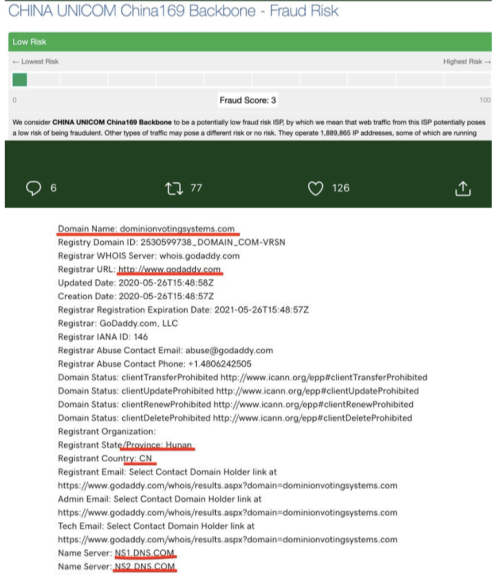Intelligence Officer Presents Evidence of Chinese Hacking Dominion Servers
A former US Army 305th Intelligence Battalion officer is charging in Sidney Powell’s Georgia lawsuit that the 2020 US election was compromised by hackers from China. Presidential candidate Joe Biden has mockingly been referred to as “Beijing Biden” for his softening of tone with respect to US policy on China. (See: Kraken: Election Stolen Say US Army 305th Intelligence Battalion Officer, and CIA Spy-Buster “Hero”)
The officer has filed partial evidence for his allegations. The evidence is only intended to set the stage for more direct evidence upon forensic examination of machines used in the election.
Last weekend, Georgia election officials attempted to wipe clean Dominion vote-counting machines which are being demanded by the plaintiffs for forensic analysis. The episode saw an unprecedented evidence battle as federal judge Timothy Batten ordered the evidence preserved, then reversed himself, then reversed himself again at 10pm on a Sunday night, as the Internet raged. At present the machines are under a 10 day injunction ordering them not to be erased.
On page 9, of his affidavit, the former intelligence officer in the Georgia Kraken lawsuit states:
“the Dominion software was accessed by agents acting on behalf of China and Iran in order to monitor and manipulate elections, including the most recent US general election in 2020” (Page 9 complaint)
In a broad denial of allegations brought forth by Powell in her set of lawsuits, Dominion conspicuously omits addressing the specific evidence regarding China, saying only:
“Dominion has no ties to the Venezuelan government, nor any other foreign government, including China and Iran.”
The witness is not likely to remain redacted if the case continues to move forward. However, the argument and exhibits alone in his affidavit are enough to trigger investigation, especially in light of the fact that Georgia election officials have already shown great determination to prevent software code and data present in the machines from coming to light.
The destruction, or attempted destruction, of evidence invokes the “spoliation” doctrine, by which a judge or jury can infer guilt on the party destroying the evidence.
Georgia has said it will argue, typically in such cases, that the software on Dominion machines is proprietary. But the integrity of US elections cannot be owned by any private company or corporation.
The Georgia lawsuit begins by laying out the standard that the judges must apply for the lawsuit to be successful, that, by a “preponderance of evidence,” according to Mead v. Sheffield, the plaintiffs must only “show that there were enough irregular ballots to place in doubt the result.” This is different from a criminal trial in which the standard is “beyond a reasonable doubt.”
The former intelligence officer states on page 16 of his affidavit:
“In my professional opinion, this affidavit presents unambiguous evidence that Dominion Voter Systems and Edison Research have been accessible and were certainly compromised by rogue actors, such as Iran and China. By using servers and employees connected with rogue actors and hostile foreign influences combined with numerous easily discoverable leaked credentials, these organizations neglectfully allowed foreign adversaries to access data, and intentionally provided access to their infrastructure in order to monitor and manipulate elections, including the most recent one in 2020.”
The document then presents a number of exhibits and explanations of these, in support of the witness’s contentions.
Screenshot from affidavit

The following are excerpts from the affidavit. FULL AFFIDAVIT FULL GEORGIA COMPLAINT
“Dominion Voting Systems Corporation in 2019 sold a number of their patents to China (via HSBC Bank in Canada)…Of particular interest is a section of the document showing aspects of the nature of the patents dealing with authentication:”
…..
“Dominionvoting is also dominionvotingsystems.com, of which there are also many more examples, including access of the network from China. The records of China accessing the server are reliable.”
Dominion Security Was Criticized by Senators Elizabeth Warren, Ron Wyden, and Amy Klobuchar in 2019
In December 2019 Senators Elizabeth Warren (D), Amy Klobuchar (D) and Ron Wyden (D) issued a formal complaint to Dominion Voting Systems regarding “switching votes”:
“In a December 2019 letter to Dominion Voting Systems, which has been mired in controversy after a human error involving its machines in Antrim County, Michigan, resulted in incorrect counts, Democratic Sens. Elizabeth Warren, Ron Wyden, and Amy Klobuchar and congressman Mark Pocan warned about reports of machines “switching votes,” “undisclosed vulnerabilities,” and “improbable” results that “threaten the integrity of our elections.”
Chinese Government Accused of Act of War
The Chinese government has been accused of deliberately creating coronavirus and releasing it to America to bring the American economy to its knees. Last April, Newsweek reported that Wuhan Lab had received US funding through the NIH and Dr. Anthony Fauci, in “Dr. Fauci Backed Controversial Wuhan Lab with U.S. Dollars for Risky Coronavirus Research.”
China is a totalitarian society which leads the world in technological control of its population, using technology which includes widespread facial recognition video cameras and software. The control model enables the government and big business in China, such as the Foxconn Apple iPhone factory in Longhua, to enforce working conditions so heinous that safety nets have been set up at factories to catch workers regularly attempting suicide.
President Donald Trump throughout his administration has conducted trade war with China, cracking down on the pirating of intellectual property. Biden has adopted a conciliatory approach to the Chinese regime. Since the Clinton administration, through both Bush and Obama, US technology has helped China become a military superpower. This ended under Trump’s confrontational approach to China.

Worker suicide nets in China
Originally published at Evidence 2020.
Read Next


